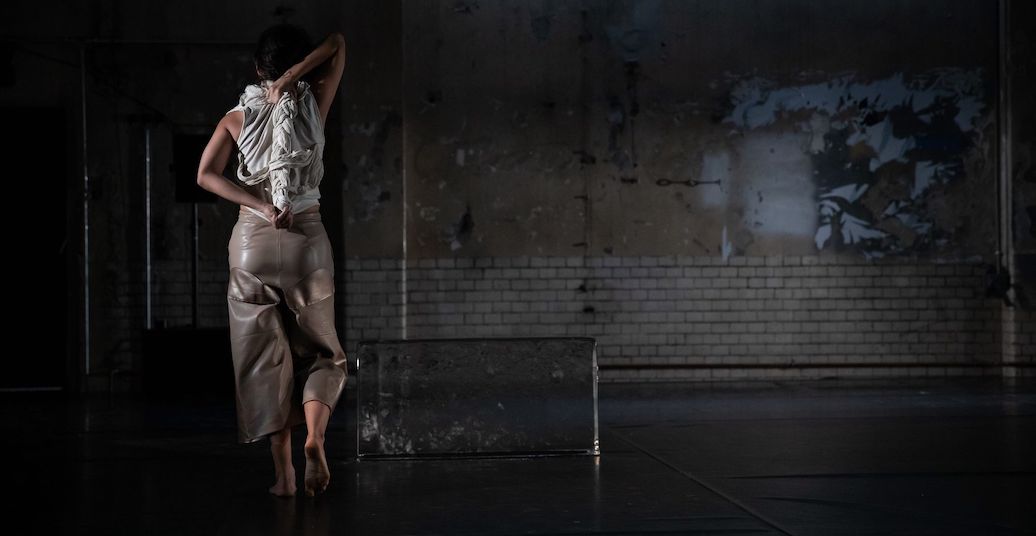Dancer and choreographer Caroline Alves, also known as a member of the dance company Grupo Oito, presents the piece “Transatlantica” from 4 – 6 May 2023 at English Theatre Berlin: an autobiographical dance solo in which she probes the gaps in the colonial historical record via the story of her great-great-grandmother.
No element is more susceptible to romantic appropriation than water: it’s seen as the element of life and as the connective link between all human and nonhuman beings. Water and its many material, mythical, chemical, and poetic states are also the aesthetic starting point for Caroline Alves’ performance “Transatlantica.” Alves’ spoken, danced, and somatic chronicles move through video footage of feet and hands on the beach and an overflowing enumeration of watery attributes, to the infinite attributability of water and to moments in which Alves herself rolls from one side of the stage to the other like a wave undulating back and forth. And, not least, she is surrounded throughout by literal water—frozen water in the form of a rectangular, crystal-clear block of ice approximately one meter long, and liquid water given similar form by an aquarium (stage design: Daniela Bevervanso). The story she tells, however, is a much more ambivalent, and to a certain extent colored by colonialism, history of water than its everyday usage suggests. Water in which countless deported Africans met their death during the crossings of the transatlantic slave trade. Water that brought the European invaders that almost completely wiped out Indigenous populations.
In the solo performance, Alves follows the traces of her Brazilian great-great-grandmother Senhorinha (like the English “miss” or German “Fräulein”), an Indigenous slave. How can you breathe life into a figure for whom not even the actual name has been passed down, but only the way the colonial masters referred to her? Where do you begin looking when it seems that nothing was documented? “Transatlantica” investigates physical, relational, spatial, and cultural voids that were opened up by the violent cutting of connections. This search leads Alves to, for example, her body, in which she rediscovers her ancestor: she appears through traumatic-seeming spasms that slowly transform, through the strenuous reappropriation of forbidden movements, into self-confident dances—and isn’t that perhaps the great-great-grandmother herself dancing along, there on the wall, in the huge shadows cast by Alves’ movements? Upstage, film footage is projected again from time to time (video: Tito Casal). In it, you can see the limbs of an unidentifiable person, ankle-deep in onrushing waves, digging holes in the ground with their bare hand, or drawing patterns in the sand. Maybe the audience is witnessing an attempt to bridge two distant worlds? Towards the end this even seems like it has been achieved when the spiral contours of the traces Alves leaves on the dance floor with her wet shirt synchronize with those in the sand somewhere far away.
“Transatlantica” unfolds along a block of ice that acts as the spectacular, manifest, and at the same time ephemeral counterpart to all the fleeting moments and subtilities that the performance attempts to capture (dramaturgy: Nora Tormann). At the beginning, the ice seems to be anchored firmly upstage left when Alves nestles up against it or lies on it, its complete transparency giving a bit of an impression that she is floating in the air. Maybe a striking image for the powerful influence of the gaps in the colonial record that in spite of their invisibility are materially reflected everywhere? About halfway through the piece, Alves sets the ice block in motion, slowly and with visible effort. The watery trace it leaves in its wake as it travels across the stage gives rise to associations with a ship crossing the sea. Again, a little later, she gives the ice a rotational spin, and thereby establishes a connection between her own body on the stage and the body projected on the wall: both, in the course of the performance, return over and over again to circling. Ultimately, Ales takes a hammer and giant nail to the block of ice and in a cathartic finale, hacks it to pieces with furious relish. What remains is an icy scene of carnage, reflected on the screen like a map of the unsurveyed.
English translation by Cory Tamler
„Transatlantica“ by Caroline Alves can be seen from 4 – 6 May 2023 at 8 pm at the English Theatre Berlin. Tickets at etberlin.de.




